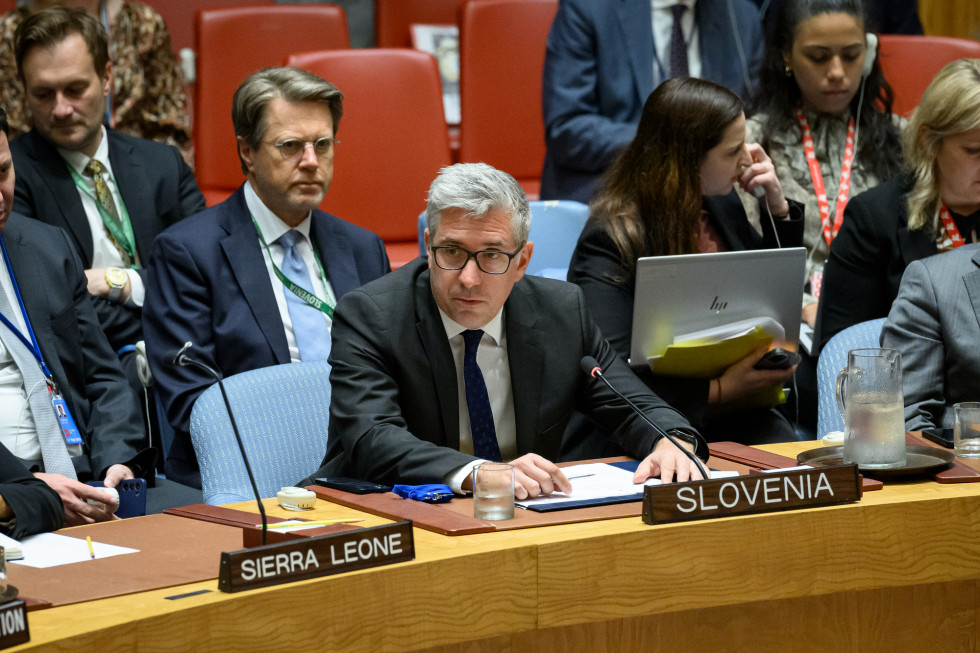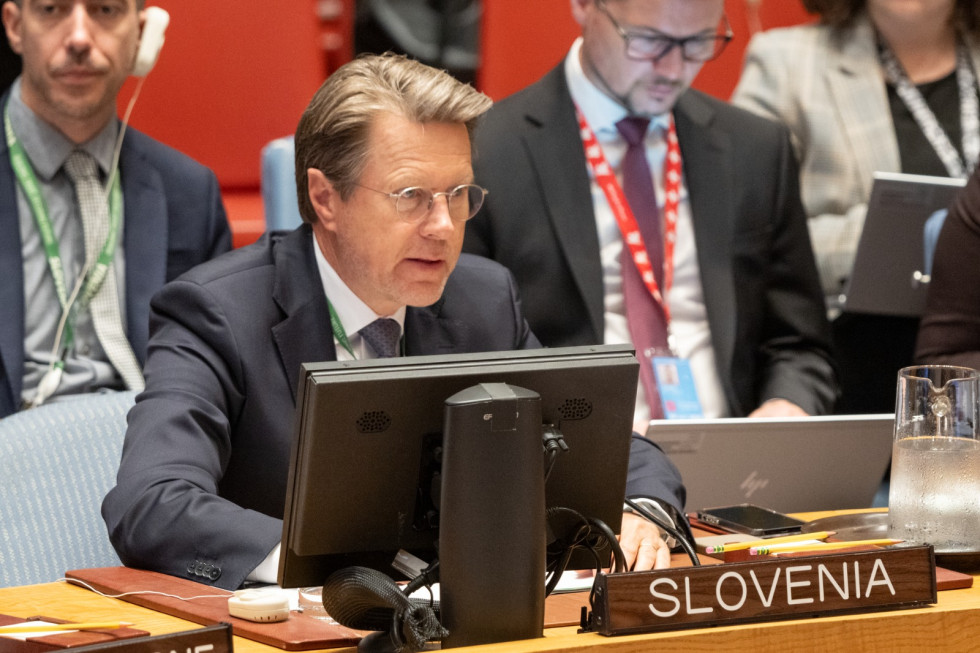Highlights of Slovenia's work in the UN Security Council in May 2024
The Mozambican presidency organised two open debates on the protection of civilians in armed conflict and on strengthening the role of African states in addressing global security and development challenges, as well as a debate on the role of women and youth in international peace and security.
There was also a debate on the situation in Bosnia and Herzegovina, with the participation of State Secretary Štucin of the Ministry of Foreign and European Affairs. The High Representative for Bosnia and Herzegovina, Christian Schmidt, gave an update on the situation in the country. State Secretary Štucin stressed the importance of respecting the territorial integrity and sovereignty of Bosnia and Herzegovina, reiterating that the country’s future lies in the EU.
In May, following the start of the Israeli military operation in Rafah, the Security Council held several briefings on the situation in Gaza, including on the discovery of mass graves at the sites of destroyed hospitals in Gaza. On 10 May, after several days of negotiations, the UN Security Council adopted a press statement on the mass graves at the initiative and insistence of Algeria, encouraged by Slovenia. On 20 May, at the joint initiative of Algeria and Slovenia, the Security Council discussed the escalation of the situation in Rafah, and on 28 May Algeria presented a draft resolution demanding an immediate cease-fire in Gaza and halt to Israel’s military operation in the southern city of Rafah, which is still under negotiation.
On two occasions in May, the Security Council also discussed the situation in Ukraine, namely Russian attacks on critical infrastructure, in particular energy infrastructure, and foreign arms supplies to Russia and Ukraine. Meetings and consultations were also held on the developments in Yemen, Libya, Syria, Iraq, Sudan and the Democratic People's Republic of Korea.
The situation in Sudan was discussed by the Security Council on 24 May, following two successive letters from Sudan itself regarding external actors involved in the war. The UN stresses that the humanitarian catastrophe has reached epic proportions, with the threat of famine, a lost generation of children and an alarming level of sexual violence. The Security Council expressed its unanimous support for the efforts of the Secretary-General's Personal Envoy and reiterated its call on the parties to stop the fighting and return to the negotiating table. The Security Council is expected to continue this kind of pressure in the coming months.
On 24 May, the Security Council adopted a resolution on the protection of humanitarian personnel, strongly condemning attacks and all forms of violence, including sexual and gender-based violence, threats and intimidation against humanitarian personnel as well as against UN and associated personnel. On 30 May, the Security Council adopted a resolution extending the sanctions regime imposed on South Sudan and the mandate of the Panel of Experts for one year. On the last day under the Mozambican presidency, the Security Council unanimously adopted a resolution on the final extension of the mandate of the United Nations Assistance Mission for Iraq (UNAMI) until 31 December 2025.
The Council also extended the mandate to authorise the implementation of the arms embargo against Libya.
In May, the Security Council issued press statements on the situation in Libya and on the urgent need to investigate mass graves in Gaza. It also adopted two presidential statements on strengthening the role of African countries in addressing global security and development challenges and on the situation in West Africa and the Sahel (UNOWAS), which contains important elements on climate security and ensuring quality water supply.
On 23 May, Slovenia and Switzerland, in cooperation with several other countries, international organisations and think tanks, launched the Global Alliance to Spare Water from Armed Conflicts, which will serve as a platform for coordination between member states, policy implementers, civil society and academia on conflict-related damage to water resources and infrastructure, raising awareness of the consequences for the civilian population and discussing how to close legal and policy gaps in water protection.
Aware of the numerous operational, political and financial challenges faced by the United Nations Relief and Works Agency for Palestine Refugees in the Near East (UNRWA), especially in recent months, Slovenia, together with fifteen other countries, presented on 22 May an initiative of shared commitments to UNRWA. The shared commitments cover UNRWA's role in Gaza and its importance for stability in the region, its financial situation, issues related to the principles of neutrality and recognition of the tireless efforts of its staff, the importance of cooperation with the Agency, etc. All UN Member States were invited to join the initiative.



